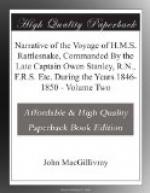On casting anchor, Mr. Kennedy, in company with Captain Merionberg, proceeded in a boat to examine the shores of the Bay, and to determine on a suitable landing-place for the horses, but returned in the evening without having been able to discover one.
The attempt was renewed the next morning, and continued during the entire day; and on the morning of the 23rd of May Mr. Kennedy and Captain Merionberg returned to the ship with the intelligence that they had discovered a spot where the horses might be landed with tolerable safety, and where, too, there was plenty of grass and water. This was an important desideratum, as we had lost one horse and eleven sheep on the voyage.
The water round the shores of the bay was very shallow, in consequence of which the vessel could not approach close inshore, but was compelled to cast anchor about a quarter of a mile off, and this distance the horses had to swim.
In the afternoon the vessel was anchored off the landing-place, and early on the following morning (May 24th) the tents, tether ropes, and sheepfold were taken ashore, with a party to take care of the horses when landed. At ten o’clock A.M., slings having been prepared, we commenced hoisting the horses out of the hold, and lowering them into the water alongside a boat, to the stern of which the head of each horse was secured, as it was pulled ashore. One horse was drowned in landing, but all the others were safely taken ashore during the day. The weather this day was very cold, with occasional showers of rain.
During the time occupied by landing the horses, a number of aboriginal natives assembled on the beach; they evinced no symptom of hostility, but appeared much surprised at our horses and sheep. White men they had frequently seen before, as parties have landed on the beach from surveying vessels.
We found no difficulty in making them comprehend that we desired to be friendly with them, and they advanced towards us with green boughs in their hands, which they displayed as emblems of peace. We met them with our arms extended and our hands open, indicating that we had no implements of war with us. We made them a present of two circular tin plates, with Mr. Kennedy’s initials stamped upon them, and chains to hang them round the neck; we also gave them a few fish-hooks, and they accepted our presents with great demonstrations of pleasure. We made signs for them to sit down about 200 yards from the spot where the horses and sheep were being landed, and marking a line upon the sand we made them understand that they were not to cross it to approach us. One of our party was placed amongst them to enforce this regulation, which he did with little difficulty, although they expressed great curiosity as to various articles brought on shore from the ship.
These natives appeared to be very fine strong men, varying much in intelligence and disposition. I entered into such conversation with them as we were enabled to hold, and I soon found that while some were eagerly anxious to learn the names of different articles and their uses, others were perfectly indifferent about them.




